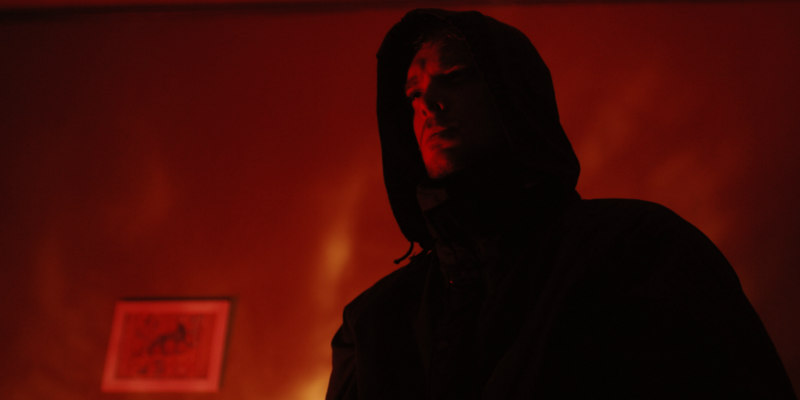
Review by Benjamin Poole
Directed by: Aik Karapetian
Starring: Maija Doveika, Kaspars Znotins, Dainis Grube, Kaspars Zale

At last! A film that focuses on the anxieties of the straight, white, middle-class male. Those poor chaps, vertiginously clinging on to the higher echelons of the patriarchy, mired within a hegemony which comfortably reflects their character, their aspirations and interests. Have a blanket and a nice sit down, lads, etc. But, sarcasm aside, hell is going on with mainstream masculinity? Why the insecurity, the fear, the ensuing fury? The fellas you see obsequiously wiping milkshake off Tommy Robinson, the England fans throwing bottles at children in Porto: what is wrong with these pricks? At the extreme end we could dismiss such behaviour as an extension of manspreading, a need to dominate an increasingly diverse culture. But that would be to evade such uncomfortable truths as the continuing rise in male suicide and depression, the foregrounding of a type of masculinity which is arguably as fantastical and damaging as the female size zero representation all those years ago. Surely this is an area that deserves examination, and, if the investigation is as thoughtful, unflinching and coruscating as Aik Karapetian’s Firstborn, then all the better.


In the unpleasant nomenclature of the internets, Francis is a ‘cuck’ (note how the modern male pejorative mode - snowflake, cuck - hones in on suggested inability to manage emotions and keep your house in order). With his high forehead and little round glasses, Francis is a nebbish and automatically awkward, none more so than in the film’s opening, where, during a tipsy game of truth and dare with another bored middle-class couple, his free spirited wife spins an apparently untrue, yet convincingly salacious, tale of marital infidelity. Francis’ partner, Katrina, is ‘liberated’ and radiates the sort of forcible sexual energy that is unknowable in its autonomy and dominance, i.e., the sort of woman who makes certain men highly uncomfortable. Katrina is played by Maija Doveika, Jena Malone’s slightly older foreign exchange student. That is to say, by heteronormative standards, she is insanely hot (adversely, Kaspars Znotins’ Francis reminded me of none other than comics clever clogs Kieron Gillen), an indisputable aspect which Karapetian ruthlessly exploits within the mise-en-scene; Katrina’s arse sort of nudges into frame now and again, we cross cut from close up to long shot when she is the subject, the push/pull antagonism of desire and frustration, imbuing the diegesis with a leering pressure. Talk about the male gaze!

As the film progresses, this expressionist style of Firstborn will take on higher levels of figurative resonance, all the better to communicate Francis’ increasingly paranoid mindset. But for now, the atmosphere is undaunted and brutally sober as we witness the hapless couple, arguing in the street about Katrina’s maybe-shag-about, almost get knocked down by a motorcyclist, who then proceeds to duff up Francis, and threaten to rape Katrina with an iron bar. It’s completely horrible, not least of all for the queasy implication that a ready recourse to overcoming female independence is brute force, but also the perceived failure by Francis to protect his wife. It really fucks him up for the remainder of the film, in fact.
So much so, that he decides to track down the assailant and, in doing so, manages to accidentally kill him! Doh! The subsequent drama essays the emotional and psychological fall out from these early events, the murder, the assault, and, crucially, the perhaps-infidelity, which, seemingly, of all the unfortunate events, is the one that Francis cannot let go of. Matters are further complicated by two factors: one, Katrina is pregnant… and, two, someone seems to know what Francis did upon that rainy day in the woods…


Or do they? Like other great texts which subjectively explore fractured masculinity (let’s go with Taxi Driver, the daddy of them all, and, go on then, Barton Fink), Karapetian’s film transposes towards the realm of myth and metaphor. Is the ever present Gatis (the motorcyclist, Dainis Grube), with his rough trade hotness, a Jungian animus? When Francis imagines Gatis shagging his wife, does he want to be him or be fucked by him? He has no idea, and so the film weaves in narrative oddities such as a rampant beast that haunts the forests fringing the city, and a hunter gatherer archetype who Francis befriends in a (pitiable) attempt to reassert his masculinity. All this at the expense of his bulgingly pregnant wife, and the blood crimson décor of the nursery, an impending inconvenience which provokes terror in your man, being as it is beyond his control and which may actually involve him, you know, stepping up.
As a movie, Firstborn is original, weird and completely gripping. As a screed that takes maleness as its subject, it is entirely uncomfortable in its suggestions and near nihilistic in its wretched conclusions. Unmissable, in other words. Get in there, lads.

Firstborn is on DVD/VOD now.
"The latest entry in the growing sub-genre of European dramas that employ fantasy-horror elements as an allegory for a young girl's self-discovery."— 𝕋𝕙𝕖𝕄𝕠𝕧𝕚𝕖𝕎𝕒𝕗𝕗𝕝𝕖𝕣.𝕔𝕠𝕞 🎬 (@themoviewaffler) June 23, 2019
BLUE MY MIND is in UK cinemas now.
Read @hilliseric's reviewhttps://t.co/M27SMulo4R pic.twitter.com/8WrHzWKw90

